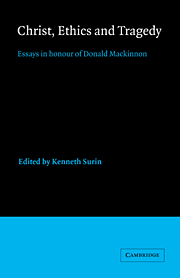Book contents
- Frontmatter
- Contents
- Preface
- Donald MacKinnon
- 1 Theological rhetoric and moral passion in the light of MacKinnon's ‘Barth’
- 2 Idealism and realism: an old controversy dissolved
- 3 Modes of representation and likeness to God
- 4 MacKinnon and the parables
- 5 Trinity and ontology
- 6 Some aspects of the ‘grammar’ of ‘incarnation’ and ‘kenosis’: reflections prompted by the writings of Donald MacKinnon
- 7 Tragedy and atonement
- 8 MacKinnon and the problem of evil
- 9 Pride and international relations
- 10 ‘Between purgation and illumination’: a critique of the theology of right
- 11 On being ‘placed’ by John Milbank: a response
- Index of names
- Index of subjects
9 - Pride and international relations
Published online by Cambridge University Press: 11 March 2010
- Frontmatter
- Contents
- Preface
- Donald MacKinnon
- 1 Theological rhetoric and moral passion in the light of MacKinnon's ‘Barth’
- 2 Idealism and realism: an old controversy dissolved
- 3 Modes of representation and likeness to God
- 4 MacKinnon and the parables
- 5 Trinity and ontology
- 6 Some aspects of the ‘grammar’ of ‘incarnation’ and ‘kenosis’: reflections prompted by the writings of Donald MacKinnon
- 7 Tragedy and atonement
- 8 MacKinnon and the problem of evil
- 9 Pride and international relations
- 10 ‘Between purgation and illumination’: a critique of the theology of right
- 11 On being ‘placed’ by John Milbank: a response
- Index of names
- Index of subjects
Summary
I suppose that every effort at creative thought, at thinking beyond the limits of what one knows already, is a kind of secret dialogue. A number of presences in the mind, imagined listeners and respondents, shape the direction and energy of the effort. How they will respond conditions the effort before one begins. How they take it shapes the endeavour as it proceeds. And very often, mercifully, they bury it without trace before it reaches the outer world, what we call the real world. To say anything very definite about one or more of these inner voices is difficult because they are at once so intimate and so withheld. It is not like reporting on rules that one is conscious of following, because the secret listeners do not respond on the basis of any rules that one can formulate to oneself. That is one mark of their being so personal. They are living presences precisely because their reply, which may be no more than a cocked eyebrow, cannot be predicted but must be heeded. For me to talk sense about Donald MacKinnon is therefore singularly difficult: one of my inner voices answers to that name, and at the same time there is also such a person out there in the real world, well known to you all and to himself. Of which of these two should I speak, knowing that the inner one is shaped by my sense of what the ‘real’ one is like?
- Type
- Chapter
- Information
- Christ, Ethics and TragedyEssays in Honour of Donald MacKinnon, pp. 146 - 160Publisher: Cambridge University PressPrint publication year: 1989



